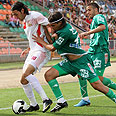

It's a rainy Saturday morning. Members of Hapoel Tel Aviv and Hapoel Ra'anana youth soccer teams are running around on the grass, kicking the ball, ignoring the downpour.
The only woman on the field is running along the length line, letting the rain drops mess up her hairstyle. She is quick to wave the flag when the ball passes the line, drawing a dirty look from the Hapoel Tel Aviv player who kicked the ball out. This is all a typical Saturday for the lineswoman Hiba Arja.
On Saturdays, Arja is not the same person that she is during the week. When we meet a day earlier, nothing about her looks – the carefully blow-dried hair, the tight dress, the delicate make up – divulges what she does. Only on Saturdays does she put the dresses away and don her referee uniform, cleats and all. She gathers her hair in a long ponytail and sets out to conquer the soccer field. But the make up stays on. "Who knows," she explains. "Maybe I'll meet a husband?"
Arja, 26, is one of the only two Arab lineswomen in Israel. Aside from guarding the lines at youth league games, she serves as a member of the referee team at Liga Alef (the third tier league in Israeli soccer), where she is one of three female lineswomen – the other two are Jewish.
"I am a referee in the full sense of the word," she says. "I see things that the central referee does not see, immediately notify him with the buzzer on the flag and indicate which card he should take out."
'They don’t make it easier for girls'
She lives in the central Israeli town of Ramat Gan, but was born in the northern Israeli Arab village of Fureidis. As a kid she used to go to soccer matches with her cousins; this how she fell in love with the game.
"I always focused on the referees instead of the players," she says. "I watched how the linesman raises the flag, how he indicates a corner kick, offsides – it really interested me."
Like many other young Arab women, Arja left her home town after graduating from high school, and moved to Tel Aviv, where she earned a Bachelor's Degree in physical education at Kibbutzim College.
For someone with dark skin and an accent, Arja recounts, blending in the big city is not an easy feat. "When I arrived in Tel Aviv I found an apartment with two Jewish roommates," she remembers. "Once I decided to sign the contract, they asked where my accent is from, and I said, 'I'm Arab.' One of them said, 'How am I going to tell my friends that I live with an Arab?' I swear, they cancelled my contract."
Her journey in the soccer world began five years ago, when she passed an entrance test to a referee course. Every year, she must pass three official fitness tests given by FIFA and UEFA. "They don't make it easier for girls," she says.
Arja still remembers her first game. It was a youth game in the national league, which took place at the end of her referee course.
"The excitement was crazy," she says. "I didn't understand what was going on. I went down to the dressing room with tears in my eyes. After that, I was broken in."
'Fans yell, 'Go home, stinky Arab''
Soccer referees are not a wildly popular bunch as it is, but Arja also has to deal with both racist and sexist expressions. "Once a fan yelled at me, 'Go back to the village, stinky Arab,'" she recalls. "I was hurt, it was humiliating, but I made an effort to focus on the game.
"When a player makes a racist remark, he gets the red card," she notes. "The problem is the crowd. Sometimes they yell, 'Your place is at home,' or 'Are you on your period today?' and stuff like that, words that are directed at me as a woman and not an Arab. It happened that they yelled at me, 'Have you had Jachnun today?' because they think I'm Yemeni."
The situation is not much better in women's soccer. "In the screaming and cursing there is hardly any difference," Arja says. "Except for the fact that there are not many fans at women's games, and the players are weaker."
She tries to avoid confrontations with the female players. "There are some who complain, women are whiners," she says. "But I'm not their friend. I made a decision, so there's no argument."
Physically, Arja notes, judging men's games is harder, because the level of playing is higher, but she feels like men respect her more because she is a woman.
'Mom worries I won't get married'
Arja's parents had difficulties accepting her choice, but ultimately they made peace with it. "When I tell them about games that I refereed, my dad tells my mom, 'Look at what she's dealing with,'" she says. "My mom worries that as long as I'm a referee, I won't find a husband. My brothers prefer not to talk about it. For them, it's not an honor."
Refereeing is not a profitable line of work, and one must find something to do in the time between Saturdays. During the week, Arja works as a researcher for documentary films and as personal trainer. In the beginning of the school year, she attempted to put her education degree to use, and began teaching sports at a school in Fureidis, while still living in Ramat Gan. To the disappointment of her parents, who hoped she would move back home after finishing her degree, this arrangement did not last long.
"It's difficult to work in the village," she says. "It didn't work for me, and not only mentally. It was difficult traveling from Fureidis to Ramat Gan and back, and it's not a position that I see myself in for the future."
This was not the only thing that Arja's parents disapprove of. While still working as a teacher, she auditioned for the Israeli version of the reality show Big Brother. If anyone wondered where was the required Arab this season, here is the answer: Arja was accepted, but gave up the role last minute.
"It didn't work for my family," she explains. "My mother opposed it very much. In the end I decided to give it up, even though I already signed. Truthfully, after a week of watching the show I realized that it's not for me."
'I'm against intermarriage'
It is never easy for women to work in a man's field, but for a young woman that hails from the conservative Arab village it's even harder. While her parents might have resigned to the idea, being a soccer referee does not raise her popularity among Arab men.
"It's hard for them to accept a young woman who runs around in shorts between 22 men on the field," she explains. "Once in a while I meet guys, but right now I'm alone."
The lack of marriage prospect is not what's going to make Arja quit. "Every Arab woman who wants to do something or reach something, should try to achieve it, even if it's not accepted," she says. "I am all for crossing the lines. Eventually the family will accept it."
Addressing the incidence of Arab women being murdered in Israel for dishonoring their families, she recognizes the difficulties but still stands her ground. "It's true, unfortunately our society is not so developed, and doesn't accept girls who leave the system," she says. "But a girl must go in a way that she believes in. Of course, you can't forget where you come from."
While she acknowledges that she does not keep in touch with friends from the village, and even if she married some from there she sees her life in the center of Israel, there are some lines she is not willing to cross.
"I am not for intermarriage," she says. "It's different with relationships. They look at women differently. An Arab man who marries a Jewish woman would be welcomed, but as a woman, you can't do whatever you feel like."
- Follow Ynetnews on Facebook















